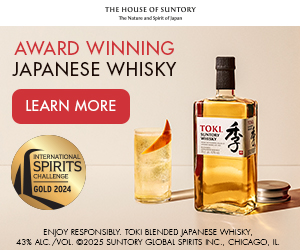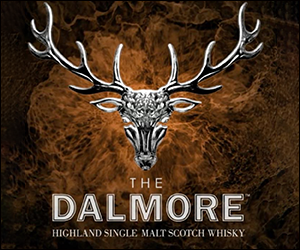Stories
Whisky is a passion to explore. From the history of the spirit to the evolution of the industry, the story of whisky helps fuel that passion. Often, it’s easy to forget that whisky is also a global multibillion dollar industry. The stories of whisky — from news and new releases to in-depth inquires and what goes on behind the label — blend together to help us appreciate the spirit of whisky.
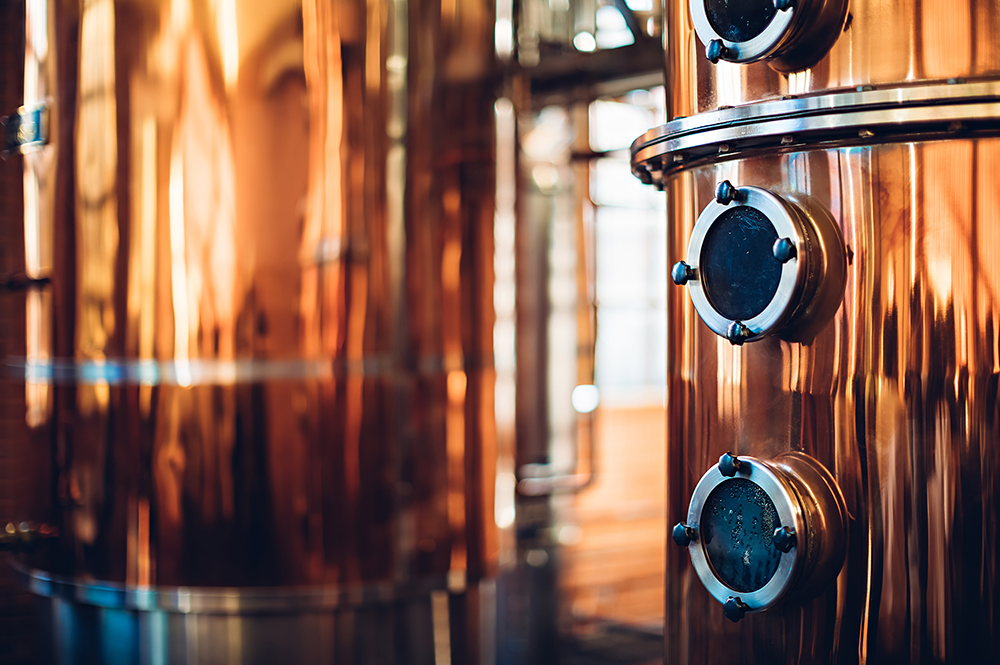
Explaining the Trump Administration’s Whisky Tariff
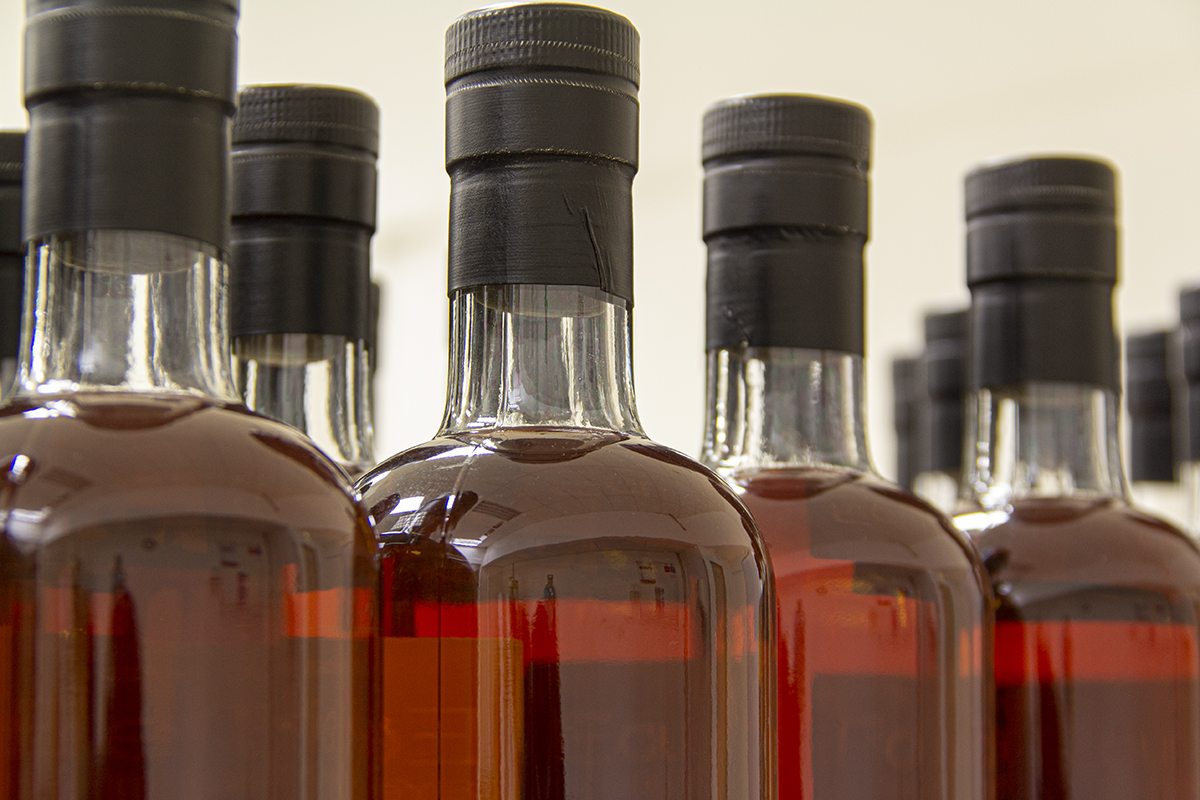
By Mark Gillespie
October 18, 2019 – We’ve received a lot of questions about the Trump Administration’s decision to impose a 25% tariff on imports of single malt whiskies from Scotland and Northern Ireland, along with liqueurs, wines, and other goods from throughout the European Union. It’s hard to cut through all of the bureaucratic language, so we’ve cranked up the red tape translator to try and answer some of your questions in plain English.
Where did this come from?
We had to use a different translator to put that question into language that can get past profanity blockers.
In 2004, the Bush Administration filed a complaint at the World Trade Organization accusing EU members France, Germany, Spain and the United Kingdom of violating the trade body’s rules by providing low-interest loans to European aircraft maker Airbus. These “launch aid” loans were used to finance the development of Airbus commercial aircraft that compete with Boeing, and the U.S. argued that those loans were illegal government subsidies.
The European Union responded with a complaint of its own accusing the U.S. of essentially doing the same thing for Boeing in the form of research grants from NASA and the Department of Defense, along with federal and state tax credits, Export-Import Bank financing, and other aid. The two complaints have been working their way through the WTO’s dispute resolution process ever since, and on October 2, a WTO arbitrator ruled in favor of the U.S. on its complaint. The ruling granted the U.S. permission to impose “countermeasures” valued at $7.5 billion to compensate for the impact of the illegal European subsidies on the U.S. economy.
The European Union complaint is still pending at the WTO, and is reported to be about six months behind the U.S complaint. Look for an arbitrator’s ruling siding with the Europeans next spring.
But why single malt whisky, and why only those from Scotland and Northern Ireland?
The Office of the U.S Trade Representative released an initial list of proposed tariffs in July, and that list included all European-made whiskies. By the time the “preliminary list” was released in conjunction with the WTO arbitrator’s ruling, the list had been whittled down to target only single malts that are “products of the United Kingdom from Scotland and Ireland.” Keep in mind that the primary targets for the tariffs are the four countries responsible for the “illegal” subsidies, including the United Kingdom, and the U.S. is the largest single export market for Scotch Whisky by value with £1.03 billion in exports during 2018.
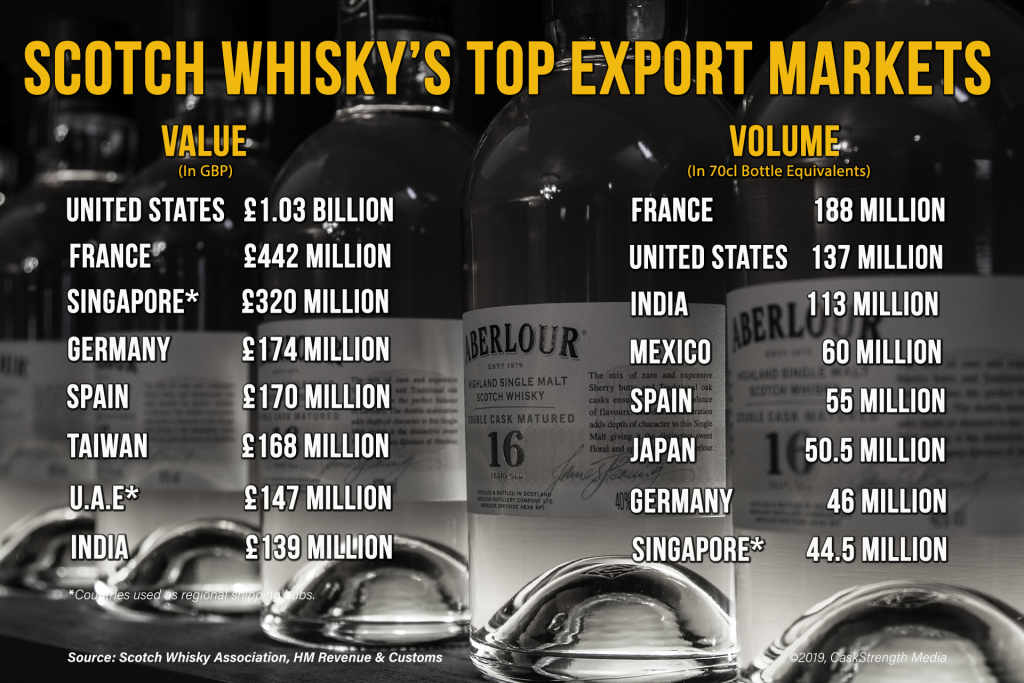
Single malts make up about 30% of those exports, and since Scotch Whisky is one of the UK’s largest exports to the United States, it was “low-hanging fruit” for administration officials who wanted to target luxury goods along with other European exports. According to the Scotch Whisky Association, single malt exports will account for about 60% of the overall impact of the tariff on the United Kingdom.
OK, but that doesn’t explain including Northern Ireland while not including Wales and England. Their whiskies are “products of the United Kingdom,” too. What gives?
That’s a fair question, and it’s one we’d like to have an answer for. The impact in Northern Ireland will largely be felt by New Jersey-based Proximo Spirits, which owns the Old Bushmills Distillery in Northern Ireland’s County Antrim and makes Bushmills and The Sexton whiskies there. Bushmills has three single malt expressions (10, 16, and 21 years old) that it exports to the U.S. along with The Sexton single malt. Company representatives have declined to comment on the tariffs since the announcement earlier this month. There are craft distillers in Northern Ireland that are distilling single malts, but they are not yet exporting to the United States.
As for not including Wales and England on the list, your guess is as good as ours. We have asked the Office of the U.S. Trade Representative for an explanation, but have not received a response. For the record, neither have the industry trade associations in Washington that have been working with the USTR on this issue for months now.
How does Brexit figure into all of this, and will the tariff end when the UK leaves the European Union?
The two are separate issues, but it’s easy to wonder whether that might be the case. While the USTR has not specifically addressed this question, a reading of the final tariff notice in the Federal Register would indicate that there’s no linkage with Brexit. If that notice had said “products of the European Union” instead of “products of the United Kingdom,” then one could make that argument. However, the original WTO complaint from 2004 specifically named the UK, France, Germany, and Spain along with the “European Communities,” since those four EU member nations were responsible for providing the subsidies to Airbus.
Can the European Union respond with more tariffs on Bourbon and other American whiskies?
Technically, no. That’s because the WTO does not allow countries to retaliate when “countermeasures” are approved. This is different from the 25% tariff the European Union imposed in July of 2018 on imports of Bourbons and other American whiskies, which was in retaliation for the tariff the Trump Administration placed on steel and aluminum exports from Europe to the United States. That dispute did not go through the WTO process, but was initiated directly by the Trump Administration on “national security” grounds to protect the domestic steel and aluminum industry.
However…remember that WTO complaint the European Union has pending against the U.S. over its support for Boeing? If the WTO arbitrator finds in Europe’s favor in that case and grants the EU the right to impose “countermeasures,” European leaders have said they will take that opportunity to impose tariffs of their own. At that point, all bets are off. The two sides have been trying to reach a compromise that could resolve the issue, but after 15 years of bickering, there’s a lot of baggage that will need to be sorted out.
What will this do to the price of my favorite single malt?
Let’s be clear for a moment – this is not a 25% tax that will be applied at the cash register when you’re buying a bottle. When a shipment of single malt whisky that’s subject to the tariff arrives at a U.S. port of entry, Customs & Border Protection agents will look at the price on the invoice accompanying the shipment to the U.S. importer. Let’s say a 9-liter case of single malt (12 750ml bottles) has a supplier invoice price of $100 – in this case, CBP would charge the U.S. importer $25 based on the 25% tariff to clear it for entry into the United States.
Now that the importer’s cost for that case is $125, the importer has to decide whether to eat that additional cost or pass it along to the regional distributor. Most of the multinational drinks corporations (Diageo, Pernod Ricard, Beam Suntory, etc.) have their own U.S.-based subsidiaries that serve as their importers, so it’s possible that they could decide to absorb part or all of the tariff costs to keep consumer prices low and protect their market share. In fact, that’s what Brown-Forman did in some European markets last year where it had control of its “route to market” to keep prices for Jack Daniel’s and Woodford Reserve steady.
Most smaller Scotch Whisky producers don’t have that option, since they work with independent importers. They may be able to work with their importers to compensate for the impact of the tariff, but it’s likely that the importers will have to pass along the higher costs to their regional distributors – the companies responsible for supplying retailers, bars, and restaurants. If every link in the chain raises its prices to cover the cost of that $25 tariff…by the time you’re buying your favorite single malt, the 25% tariff could actually cost you much more than that original $25 the importer paid at the port.
Holy $#!%! How soon will I see prices go up?
Depends on where you’re buying your whisky.
Keep in mind that as of this weekend, no single malt whisky on the shelf at any U.S. retailer has actually been hit with this tariff. The tariff will only be applied to any shipment that arrives at a U.S. port of entry starting today (October 18), and since drinks companies traditionally move a lot of product to the U.S. in advance of the holiday shopping season, there’s a lot of whisky in the system that was not subject to the 25% tariff.
That said…there’s nothing to stop a retailer from immediately raising prices for single malts from Scotland and Northern Ireland, and it’s a safe bet that some are already doing just that. Most states do not allow whisky brands and their distributors to actually dictate what prices a retailer can charge, which is why you’ll see terms like “recommended retail price” a lot. It’s the same principle that allows retailers to mark up the price of “Lot B” Old Rip Van Winkle Special Reserve Bourbon from the “recommended” $79.99 to $799.99 a bottle.
In a perfect world, retailers would adjust their prices only when replacing depleted inventory with new bottles that are subject to the tariff. Of course, if it were a perfect world, the politicians would have sorted this out years ago and we wouldn’t be facing higher prices today.
I’m traveling back to the U.S. from Scotland with some single malt whisky. Will I have to pay the tariff?
We checked with U.S. Customs & Border Protection, and an agency spokesperson confirmed that tourists will not have to pay the tariff for what’s technically called an “informal entry” where a traveler arrives at a border crossing with goods acquired outside the country. Tariffs are usually only applied to goods being imported into a country for resale, which is why whisky importing companies with the appropriate federal licenses will have to pay the tariff.
You might still have to pay duty and the federal excise tax on any bottles that exceed the duty-free limit of one liter per person, depending on what else you bought during your trip and how long you were out of the country. However, Customs & Border Protection agents at several different border crossings have told us that they have a certain amount of leeway to waive the duty if it’s a small amount – usually less than $20. It actually costs the government more to process the paperwork for payments that small than the revenue it generates. However, this practice can vary depending on where you’re crossing the border into the U.S., and some CBP stations can be stricter than others. Don’t assume that just because you’ve not had to pay any duty on previous trips means you won’t have to the next time.
I ordered some single malt Scotch from an online retailer in another country, and it’s being shipped now. Will I have to pay the tariff?
Good question. Not all online retailers work the same way, and it may depend on which retailer you’re working with. Technically, individuals aren’t allowed to import alcoholic beverages into the U.S. unless they’re traveling from another country with those specific bottles (see above). Some online retailers work around this by working with a licensed U.S. importer and shipping orders to them (usually combining orders from several customers into one package), with the importer then forwarding the whiskies on to the original purchaser. Those orders would be subject to the tariff, and it’s up to the retailer whether to try and bill you separately for that now. Don’t be surprised if those retailers adjust their pricing on U.S. orders to reflect the tariff.
If the politicians in the U.S. and Europe get their acts together and work out a compromise on the aviation dispute that leads to the tariff being removed, will whisky prices come back down to pre-tariff levels?
Our Magic 8-Ball said “probably not” and rolled under the sofa laughing hysterically.
If you have a question that we haven’t addressed yet, let us know. We’ll add more questions and answers as needed.



